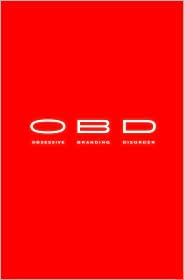Image source: bn.com
I’ve recently finished, OBD Obessive Branding Disorder – The Business of Illusion and The Illusion of Business, by Lucas Conley, who write for Fast Company. I’m way behind on blogging, so I’ll keep the book review short, and will reference the book in some other posts that have been brewing in my brain.
Conley discusses branding and marketing along similar lines as Rob Walker’s Buying In. However, he takes a much more explicitly critical view of the current practices of today’s marketers, where as Walker writes from a more description perspective. One of Conley’s most interesting passages is on “buzz agents” that are paid to push products to friends and acquaintances. His concern is that when any stranger or worse any trusted friend or family is a potential marketer, the value of our entire social network are at risk. This risk is exacerbated by coupled with findings from the American Sociological Review from 2006 cited by Conley. The General Social Survey (GSS) which measure people feelings and social perceptions, found three times the number of people who stated that they didn’t have anyone to discuss important matters, than 20 years ago. The study also reported only half of the participants claimed to have two or fewer close friends and a quarter claiming having no confidants at all. Therefore, not only are we getting more isolated, the trust of the people we do interact with is decreasing as well.
Telecommunications encourages people to seek out relationships over space, and makes it easier to avoid those in their immediate surrounding. Further, as mobility increase and people move across states and countries to attend school or to find work, traditional face to face social networks are weakened. Just as Walker states that we use brands to create our own identities, Conley states that we form communities based on brands.
One side distraction of the books is its, at times, loose use of statistics to bolster arguments. In one early section, describing how US companies are replacing innovating with marketing. This is a troubling observation, reveals in the way company reshape, repackage, reposition, and retire their products rather actually innovate. Conley cites that the number of hours worked in the US is decreasing while they are increasing in the countries, many of which are in Asia. This idea would only be relevant if more hours worked translated to more innovation, which is may or may not be true. While I agree that sacrificing research and development for more marketing and brand positioning is bad for long term business practice, confusing links to data is distracting.
Overall, OBD is a good read. He notes the ironic end point, that anti-branding voices such as Ad Buster and Naomi Klein, author No Logo, are established brands themselves. I appreciate that Conley attempts to tackle the idea of how to rethinking the brand which surrounds us. Although he doesn’t provide an actual roadmap to encourage social and corportate change, which may not even exist. If brand are inescapable, then what are people who agree with Conley to do?





I agree with him regarding the potential corruption of friendships; there’s a good philosophy article on the topic cited in this post:
http://www.concurringopinions.com/archives/2008/06/is_undercover_m.html
I heard Conley’s podcast and I think his most persuasive point is that American companies are putting more and more energy into better packaging, and less into creating better products. I do like his effort to promote the “real” and demote the “superficial.” But on the other hand, how much better can a Kleenex really get? If I were trying to sell more of them, I don’t know how I’d improve it objectively–I’d just try to market it better.
Perhaps a capitalist economy automatically wastes more money on wasteful competition among firms for market share as opportunities for true innovation in the quality of the product fade. Advertising becomes a form of positional competition–Company A would not have to do any if its competitors could all sign an “arms control agreement” not to advertise, but as soon as one does, they all have to. And perhaps in the grand scheme of things, advanced capitalist societies sow the seeds for their own destruction by wasting money on such superfluous things, allowing rising powers to take control of the resources (such as oil, timber, and farmland) that have genuine value.